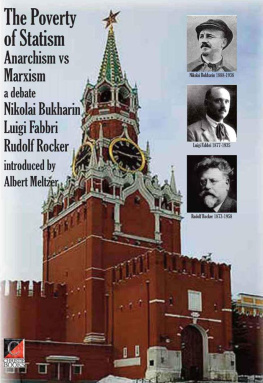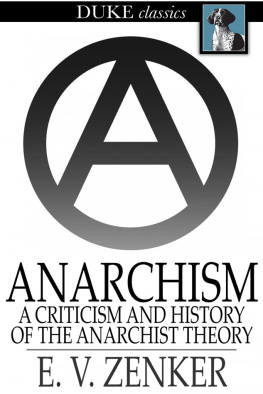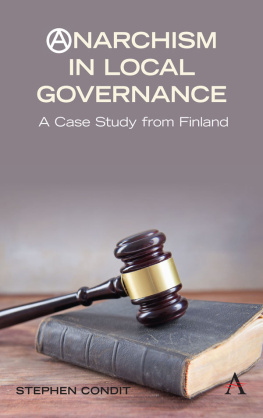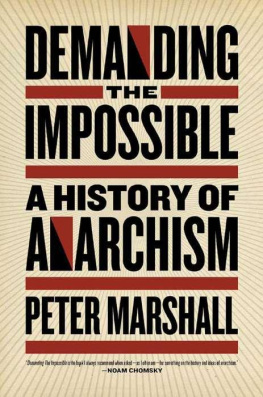INTRODUCTION by Albert Meltzer ....
INTRODUCTION by Albert Meltzer
Nikolai Bukharin was regarded by many asLenin's favourite, in spite of his many differences with the leader of theBolsheviks, the Benjamin of the Party which seized power in (or more precisely,after) the Russian Revolution. He was the youngest of the leadership, a merryextrovert among the more grim-faced professional revolutionaries, and aboveall, was popular with the Party both in Russia and abroad.
After Lenins death, Bukharin was consideredthe most likely successor to the leadership; indeed, looking round theassortment of Party hacks and armed scholars, there was no one else torecommend themselves who had the necessary background and the talents toconquer. As against the vainglorious flamboyant Trotsky and the sinisterZinoviev, Bukharin impressed greatly, and above all, there was his undoubtedpopularity with all but a handful of the Central Committee, including the obscureGeorgian, Stalin, whom nobody took very seriously at the time. However, therace is not always to the swift, and Stalin won; and by a quirk of fate futureneo-Marxist generations made a cult of Trotsky, and forgot Bukharin.
Bukharin, originally counted among theLeft Bolsheviks, and whose anti-statist arguments and conclusions Lenin drewupon for his famous State and Revolution,settled down after Lenins death to resignation with Stalin's victory. LikeTrotsky he became one of the minor functionaries of the Party, but whereasTrotsky departed in glory with an entourage and ample cash, like a departingprince, Bukharin stayed on in Russia to come into inevitable conflict with theStalinist bureaucracy. Originally one of the enthusiasts for world revolution,he came to accept the Stalin dictum that they had better be content with onecountry, and moved steadily to the right until one day the world was surprisedwith the news that Bukharin was in disgrace, accused of plotting with theGerman General Staff, and numerous other charges of sabotage, murder andAnti-Soviet activity, for which he was shot on March 15, 1938.
Was the story true? All the opponents ofStalin, and this goes for anarchists too, were convinced at the time that itwas a put-up job by Stalin to disembarrass himself of the Old Bolsheviks whomight have constituted a danger. But what danger had they ever been? Allobeyed meekly, all lived under the shadow of the Kremlin without raising anystandard of revolt, all dutifully attacked the anti-Stalin worker revolutionaries,all with the sole exception of Bukharin, who defended himself vigorously, ultimatelywent to their deaths without shouting a word in their own defence. There was agood Leninist precedent for plotting with the German General Staff; evenStalin, within a year of Bukharins execution, was himself doing it in the nameof Holy Russia. Since to the Old Bolsheviks revolution against the regime wasanathema, and the only way of altering it was by foreign intervention, if theycould have done a deal, why not? It would not have been the first time
At all events, Bukharin was shot as a spy,a traitor, and a right-wing deviationist but once he was the hero of Russian Leninismand the genius of the left wing within the Bolsheviks (not to be confused withthe ultra-leftists outside the party, but inside the soviets). It was in thiscapacity that he was asked to write something to pulverise the anarchists, withItaly particularly in mind.
It may not only have been Italian anarchismthat the author had in mind. In a passage that Fabbri particularly resents,Bukharin attacks thieves and bandits who pass off as anarchistrevolutionaries. Nothing could have been more calculated to ruffle the feathersof a puritanical anarchist of the old school, Fabbri in particular, saint-like,aesthetical, who had suffered poverty, hardship and imprisonment tor the cause.In rebutting Bukharin, in this reply desired of their mentor by Italianworkers, he at this point quivers rage and describes the author as a mad dog.Bukharin wasnt exactly that; indeed at this point he was probably using theanarchists as a decoy duck to shoot at quite a different bird, the Stalinistsin the party who had contributed heavily to party funds with their bankrobberies. Even under Lenin one could not attack the old Georgian burglar forhis expropriations, but one could safely blaze away with both barrels at... theanarchists!
And with all respect to Fabbri it was trueof some, if a few, anarchists in Russia and in other countries. Why quibble?Nor was it necessarily solely because they wanted to raise money for funds,though generally this was the case. They turned to crime because they neededthe money. There is nothing more immoral in robbing a bank than in running one,and what worker conscientiously working tor the capitalist system in return forwages can afford to scorn the bank robbers as being dishonest? This is not toglamorise the individual expropriationist (wonderful word!) but one feels oneindividual business is not better than another. One cannot blame Fabbri; the worldwas much simpler and less sophisticated in those days.
That aside. Fabbris analysis and responseto Bukharin is deadly, incisive and direct. Fabbri is an anarchist writer whoshould be better known than he is. This is probably the first time that any ofhis writings have appeared in English though he lived the greater part of hislife in the United States and is one of the ablest exponents of anarchistcommunism. More of his writings should be available and I understand thatCienfuegos Press is presently preparing an English translation of his majorwork Dictatorship and Revolution.
Like Alexander Berkman in Now and After: The ABC of CommunistAnarchism (the second part of which has been widely distributed as The ABC of Anarchism) he makes it plainthat state communism is one thing and anarchist communism quite another, thatthe Bolsheviks want communism imposed by force, the anarchists want it freelyentered into. It is this view of the relationship of state communism to anarchistcommunism that led one Christian pacifist reviewer of The Floodgates of Anarchy fifty years later, to say with horror weclearly wanted a sort of soviet system without the state. Berkman and Fabbriwould not, at least at that date, have seen this as distorted criticism. Butsoviet communism has long since ceased to be any form of communism. Some wouldhave it that it has become state capitalism, yet it is not that either. Thereis neither competition nor capitalism; the exploitation is directly by thestate, the beneficiary is the faceless bureaucrat. State communism has becomethe monstrosity anarchists predicted that it would. Bukharin found that outonly too well; it led him in despair to choose military, perhaps Naziintervention as the only way out, or, in the only other possible version, itdragged all Russia down under the personal autocracy of one man, more despoticthan any Tsar, who cravenly condemned all who approached him, in the manner ofSultan Abdul Hamid II.









